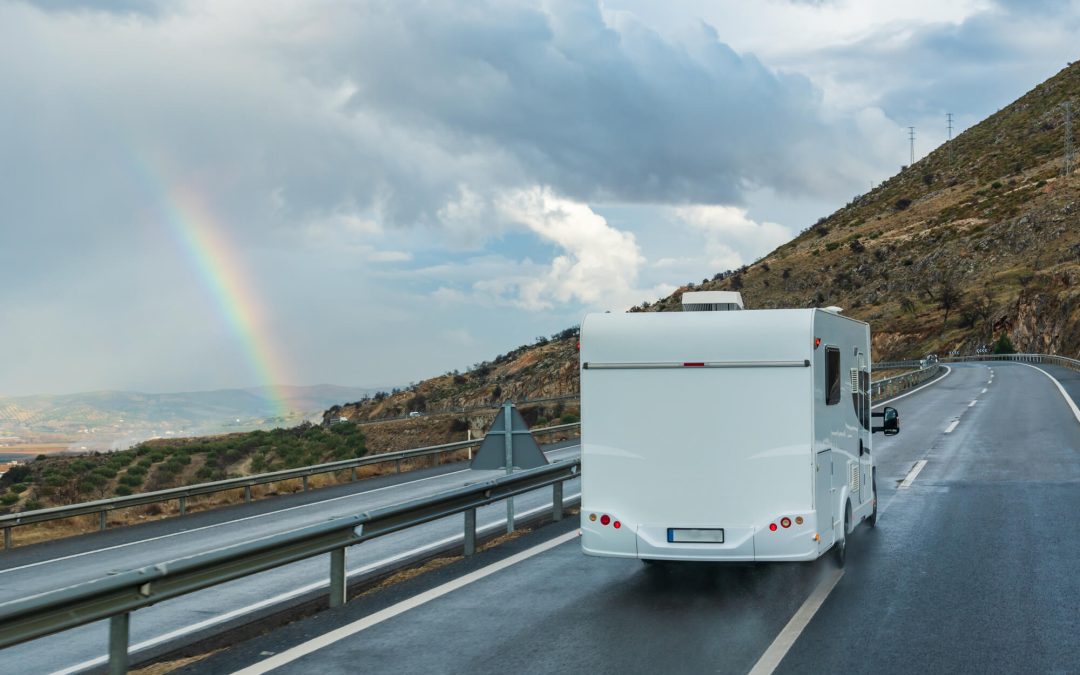Rainy weather can pose unique challenges for RVers, but with the right strategies, you can enjoy your travels regardless of the forecast. Whether you’re a seasoned traveler or new to RVing, understanding how to handle rainy conditions can make your trip fun, no matter what.
Preparing for RVing in the Rain
Before heading out on your adventure, it’s essential to prepare your RV for potential rain. Begin by inspecting your RV’s seals and weatherstripping. These components are crucial for keeping water out and preventing leaks. If you find any signs of wear or damage, address them before you embark on your journey.
Make sure your RV’s roof is in good condition. A well-maintained roof helps prevent leaks and water damage. Check for any debris or obstructions that could divert water into the RV. Installing rain guards or deflectors can also help manage water runoff and keep your windows and doors dry.
Driving Safely in the Rain
Driving in rainy conditions requires extra caution. Ensure that your windshield wipers are in good working condition, and replace them if they are worn out. Rain can significantly reduce visibility, so it’s essential to keep your windshield clean and your headlights on. Reduce your speed and increase your following distance to accommodate longer stopping distances on wet roads.
Consider using rain repellents on your windows and mirrors to improve visibility. These products can help water bead up and roll off, making it easier to see the road ahead.
Setting Up Camp in the Rain
When you arrive at your campsite, take extra care when setting up in rainy conditions. Choose a site that is less likely to flood and avoid setting up directly under trees that could drop branches or heavy rain. If possible, set up your awning to provide additional shelter, but ensure it is adequately secured to prevent damage from strong winds.
Once your RV is in place, check for any leaks inside. Inspect areas around windows, doors, and vents. If you find any leaks, use temporary measures like tarps or weatherproof tape to address them until you can repair them more permanently.
Keeping Your RV Dry Inside
Maintaining a dry interior is crucial for comfort and preventing mold growth. Use dehumidifiers or moisture absorbers to manage humidity levels inside the RV. These devices help reduce condensation and keep the air inside fresh.
Ventilation is also important. Use your RV’s exhaust fans to help circulate air and reduce moisture buildup. If you notice any signs of mold or mildew, clean the affected areas promptly to prevent further issues.
Enjoying Yourself While RVing in the Rain
Rainy weather doesn’t have to dampen your spirits. Embrace the cozy atmosphere of your RV and make the most of your time indoors. Plan activities you can enjoy inside, such as reading, playing games, or cooking a hearty meal.
Take advantage of the opportunity to relax and enjoy the unique ambiance of rain. Listening to the sound of raindrops on your RV’s roof can be soothing, turning an otherwise dreary day into a pleasant one.
FAQ
How can I prevent leaks in my RV during rainy weather?
Inspect and maintain your RV’s seals, weatherstripping, and roof. Regularly check for any signs of damage and make repairs as needed. Using rain guards and deflectors can also help manage water runoff and keep your RV dry.
What should I do if my RV starts leaking?
If you discover a leak, use temporary measures like tarps or weatherproof tape to address it until you can perform a more permanent repair. Additionally, use a dehumidifier to manage moisture inside the RV and prevent further damage.
How can I stay safe while driving my RV in the rain?
Ensure your windshield wipers are in good condition, and keep your headlights on. Reduce your speed and turn on your hazard lights if visibility becomes an issue so other cars can see you. Keep your RV well-stocked with the essentials in case you need to pull over and wait out the storm.
What should I do if my RV’s campsite floods?
If you notice that your campsite is flooding, relocate your RV to higher ground if possible. Avoid driving through standing water, as it can be hazardous. Contact the campsite management for assistance and check local weather updates to understand the extent of the flooding. Ensure your RV is secured and monitor the situation to prevent further issues.
Chief RV offers RV inspections and services in Montgomery, Grimes, Harris, and Walker counties in Texas. Contact us to schedule an appointment.

